Released: 29th March 1999
Writers: Benny Andersson / Björn Ulvaeus / Stig Anderson
Peak position: #4
Chart run: 4-5-4-12-14-21-26-26-32-35-34-42-63
Despite having collectively racked up 19 top 40 hits – including seven #1 singles – there was absolutely no way that Steps, B*Witched, Billie Piper, Tina Cousins or Cleopatra would ever get individual performance slots at The Brits. It would take something seismic to shift the snobbery surrounding the event, and it came in the shape of ABBA.
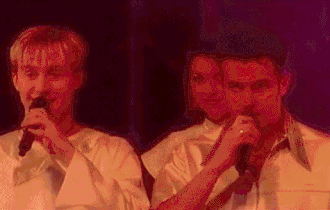
Heralding the launch of Mamma Mia! in London’s West End, pop’s finest assembled to pay tribute to the songs of ABBA, upon which the musical was based. It was a convenient move, and one that allowed the music industry to acknowledge the enduring popularity of all the acts involved in one fell swoop. You do sense however that if anyone had predicted the scale of ABBA’s resurgent popularity in 1999 – one that continues to this day – then a lot more effort may have gone into this production.

As a single, Thank ABBA For The Music is a curious proposition and one quite difficult to truly assess in its own right since it’s little more than a poorly mixed collection of four ABBA karaoke standards. But as a spectacle of ‘90s pop, Thank ABBA For The Music was actually quite groundbreaking. Nowadays we’re accustomed to our pop faves collaborating and hanging out on social media. But back in the ‘90s, pop acts rarely actually interacted with one another despite continuously doing laps of the promo circuit at the same time. Thus, the sight of Billie and B*Witched dancing to the front of the Brits stage throwing down some disco moves to the opening strains of Mamma Mia was truly a sight to behold. Some of the pairings were slightly less impactful: Claire Richards and Cleopatra should have been a powerhouse vocal moment but ends up looking more like Claire walked to the wrong side of the stage and accidentally started performing with the wrong group.
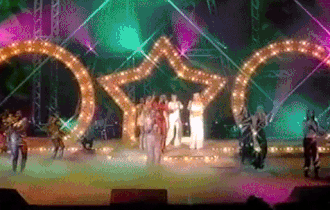
Indeed, the fact that Steps don’t really do anything collectively is somewhat odd, since they were the obvious act around which any ABBA tribute should revolve. Comparisons to their Swedish pop ancestry had followed the group throughout their debut album campaign, with some of the early singles paying deliberate homage to this. But here Steps never really get a moment in the spotlight that is totally theirs, although they would later revisit Dancing Queen in 2011 following their reformation.
I ask in all honesty, what would life be
Without a song or a dance what are we
So I thank ABBA for the music
For giving it to me
So, the songs that were included in the medley. Well, there was Take A Chance On Me, clearly included solely to give Lee and H something to do, because after the first 25 seconds they’re not heard from again. It segues quite nicely into Dancing Queen led by Faye and Tina Cousins. At which point we really need to talk about that particular elephant in the room London Arena. The criteria for inclusion in Thank ABBA For The Music seemed to be somewhat relaxed, but linking all the other acts was a successful debut album campaign and them being minimally vaguely recognisable to the general public. Tina Cousins, on the other hand…well, good for her. She seized the opportunity and ran with it.
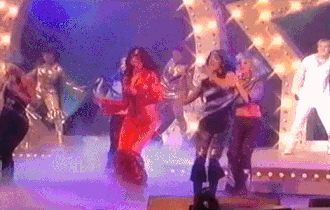
From there we move into Mamma Mia, which is one of the few moments of the song that contains a distinctive vocal performance. Sure, it might just be B*Witched doing ABBA karaoke, but it does sound like B*Witched, nonetheless. Although the song’s inclusion was a given considering the context of the performance, it’s a bit of a weird one to stick towards the climax of the medley because the chorus never really takes off from the energy in the verses. Instead what starts as a lively choreographed section ends with everyone standing static in the centre of the stage…before things completely slow down for an arm-waving take on Thank You For The Music; the big twist here being the lyric change in the final line. Well, it was a surprise if you were watching the performance unfold on television. Less so, we imagine, if the first time you’d heard it was after buying a medley called Thank ABBA For The Music where the spoiler is in the name.
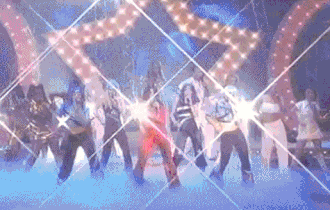
As we earlier theorised, it’s entirely possible that a lot more effort would have gone into this if anyone had foreseen the impact Mamma Mia! would have. The most jarring thing about Thank ABBA For The Music as a song rather than a performance is the transition between songs. Or the lack thereof. The production sounds like a crude mixtape and in places it actually was; the live performance had a drop between Mamma Mia and Thank You For The Music which was simply removed for the commercial release, meaning the songs just run into one another. We’d never look a gift horse in the mouth; the majority of the acts here wouldn’t grace the Brits stage again, but the haphazard mixing did nothing to quell the definite stench of “will this do” surrounding the whole affair.
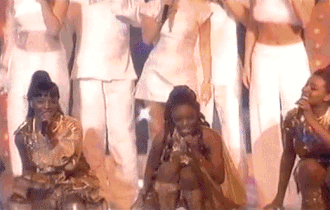
Thank ABBA For The Music, for its flaws, was a surprisingly big hit in the UK, peaking at #4 and spending several months in the top 40. It was indicative of something much bigger though; ABBA experienced a huge resurgence thanks to the popularity of Mamma Mia! It was an early example of a phenomenon that’s become a little more commonplace in pop music, where acts are nostalgically re-evaluated, and their music finds a new audience – occasionally accompanied by some long-deserved critical acclaim. 1999 was ABBA’s year and such was the extent of their revived popularity that they were awarded the very highest accolade possible: ABBAmania, an ITV tribute show that saw several of the acts from Thank ABBA For The Music return to pick off a few more cherished classics.



